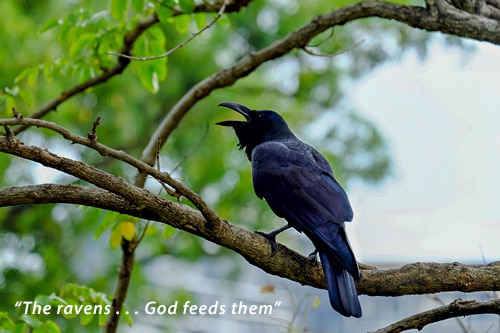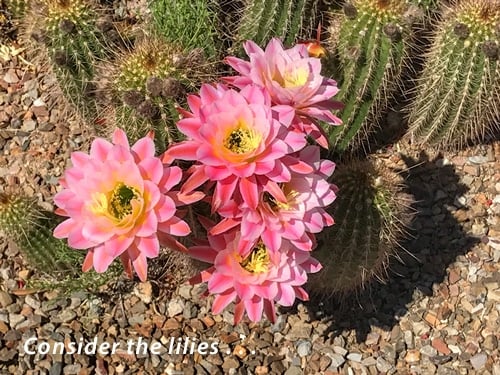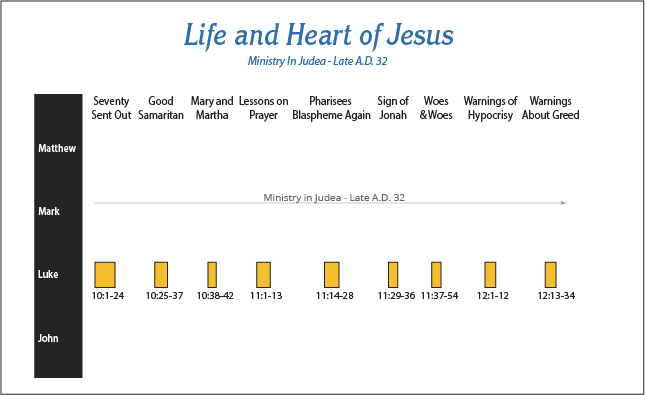
In the last study a man was greedy enough to ask Jesus to urge his brother to give up part of his inheritance that was legally his brother’s to inherit. Rather than helping the man satisfy his greed, Jesus refused and then told him a parable about a rich man who greedily hoarded his wealth, retired and immediately died. At the conclusion of the parable, Jesus revealed the horrifying verdict that the rich man’s soul would be required of him that very night. Jesus’ message was simple – do not seek treasure on earth but in heaven. Eternity is your final destiny. This study is a continuation of “The Signs of a Rich Fool.” You will discover that Jesus urges us to not seek treasure in this life and worry about food and clothing. Don’t worry about the things of this life and hoard your wealth, but instead seek God. This study comes from Luke 12:22-34.
Do Not Worry About Food & Clothing
The opening verse of the study is Luke 12:13,
And He said to His disciples, “For this reason I say to you, do not worry about your life, as to what you will eat; nor for your body, as to what you will put on. For life is more than food, and the body more than clothing.” Luke 12:22-23 (NASB)
The Holy Spirit tells us that Jesus now turns from the crowd to His disciples and repeats a message that He had given one year earlier, using some different words. It is now late in the year A.D. 32 and He apparently wants to reinforce upon His disciples the important truth that they must give their hearts to store up treasure in heaven. In verses 22-32 we will once again experience Jesus’ message but with a different conclusion.
Now let’s look at Jesus’ message. The actual Greek text does not contain the word “reason,” but it is supplied by the translators to provide clarification. A more literal translation is “For this I say to you . . .” “This” refers to the parable that Jesus had just given. The message of the parable is that storing up treasure on earth is stupid because your wealth will remain and someone else will enjoy it, and after death you will be judged and your destiny determined. Therefore, why should a person be preoccupied with hoarding treasure on earth?
Next, Jesus encouraged the disciples to not worry about the basic necessities of life such as food and clothing. In many countries around the world most of the citizens do not worry about food, clothing and housing. Instead, most people worry about luxuries such as televisions, automobiles, watches, smart phones and many other non-essentials. Notice that Jesus did not say that life is the luxuries of life. He said that life is more than the basics of life. Jesus is very practical. The basics are what we need and the luxuries are extra. He encourages us to not worry about what we must have in order to live. But most of us do! Why shouldn’t we worry?

Do Not Worry About Food
Jesus answers our question – God the Father provides for all. Jesus’ first proof is that the Father cares for the ravens.
Consider the ravens, for they neither sow nor reap; they have no storeroom nor barn, and yet God feeds them; how much more valuable you are than the birds! Luke 12:24 (NASB)
Why did Jesus specify the ravens and not all birds? We so easily read ravens, then generalize to birds and miss the significance of the fact that Jesus said, “ravens.” The point that Jesus is making is that God the Father cares for all the birds, including the unclean and detestable ravens. Why is the raven detestable? In Leviticus 11, God gave a list of land animals, birds and sea life that the Israelites could not eat because they were unclean. Ravens are on the list of unclean birds that could not be eaten. Now do you see the importance of Jesus’ statement? The Father even cares for the unclean, detestable raven. The ravens do not sow seeds into the field and they do not reap the harvest. They do not store the harvest as the rich fool did. Yet, the Father ensures that they have food to eat. The father ensures that even the unclean raven eats. Now do you see how important you are?
Do Not Worry About Health
Next, Jesus speaks about our health. Today, people worry about so many health issues. We take vitamins and minerals to ensure good health and avoid dementia. We have doctors to repair hernias, spinal columns, eye disorders, deviated noses, remove gallbladders, carpal tunnel in our hands, dentists to fix teeth and so forth. We have antibiotics to heal our lungs against bronchitis, leg infections due to insects and infections in the stomach. We exercise to maintain heart health, stay mentally sharp and enjoy life. But Jesus says it is all for nothing!
And which of you by worrying can add a single hour to his life? If then you cannot do even a very little thing, why do you worry about other matters? Luke 12:25-26 (NASB)
Notice that Jesus said it is a waste of time to be worrying about how long you will live. Why worry? The Greek word that is translated as “worry” is merimnao. The word has the sense of anxious concern. Since the verb is also a present participle, this means the person is always anxious about his or her health and how he/she will live. Jesus says, why worry since you cannot add a single hour to all of the years of your life? A person who has lived 20 years will have lived for almost 175,317 hours. A woman who has lived for 65 years will have lived for 569,781 hours. That helps us understand how small one hour is in the life of a person. Jesus says we cannot add even the very short time of one hour to our life. The reason we cannot add one very little hour is that God has numbered the days of our life. The length of our lives has even been determined to the very hour. Psalm 90:15 reminds us that God has numbered our days.
Make us glad according to the days You have afflicted us, And the years we have seen evil. Psalm 90:15 (NASB)
Therefore, why do we worry about such uncontrollable things? Why worry about other things?

Do Not Worry About Clothes
Next, Jesus urges us to not worry about clothing. He does not mean that we should go naked. He is telling us that God will supply our basics.
Consider the lilies, how they grow: they neither toil nor spin; but I tell you, not even Solomon in all his glory clothed himself like one of these. But if God so clothes the grass in the field, which is alive today and tomorrow is thrown into the furnace, how much more will He clothe you? You men of little faith! Luke 12:27-28 (NASB)
Most Bibles translate the Greek word krinon as “lilies” in Luke 12:27. Jesus said, “Consider the lilies . . .” However the word does not refer to lilies but to any uncultivated flower. Louw and Nida define the word as follows:
. . . any one of several types of flowers, usually uncultivated—‘wild flower.’ . . . Though traditionally [krinon] has been regarded as a type of lily, scholars have suggested several other possible references, including an anemone, a poppy, a gladiolus, and a rather inconspicuous type of daisy.[1]
It is important to understand that the word does not refer to a cultivated flower. We often think of lilies as cultivated flowers. This changes the meaning of the verse. Jesus is telling us that God even cares for the uncultivated flowers of the field. God cares for the flowers that we consider to be weeds and pull up out of our lawn or garden. The uncultivated flowers do not work, but they are very beautiful. God cared for them so much that they have more glory than Solomon.
Why are the lilies of the field so beautiful? God was the designer! That is, he clothed them! Even though He designed them, we spray them with weed killer. We pull them out of the ground and throw them in the trash. I remember as a teenager my father told me and my brothers to clear trees, weeds, vines and poison oak from our backyard which was about 2/3 of acre. It took us weeks to accomplish the task. As we cut down trees, we threw them on a pile. We removed the vines and cleared the wild grass, brush, the poison oak and flowers and tossed them on the pile. When we finished, the nine-foot-high by twenty-foot-long by ten-foot-wide pile was set on fire. It was scorching hot and it burned all night. Jesus says that everything my family burned God had designed and clothed. God knew everything that we did to His trees, His wild grass, His vines, and His flowers.
Now notice what Jesus said, “How much more will He clothe you? You men of little faith!” Do you see Jesus’ point? His point is that God will clothe you. Jesus said that if you say, “I cannot trust God to provide for my clothing,” then you are a person of little faith. If you do not believe He will provide for you, then you do not have very much faith.

God Does Not Want Us To Worry
Now Jesus summarizes His statements. He has been telling His disciples, the twelve plus any others, to not worry.
And do not seek what you will eat and what you will drink, and do not keep worrying. For all these things the nations of the world eagerly seek; but your Father knows that you need these things. Luke 12:29-30 (NASB)
Once again He says, “Do not . . .” This is the fourth time that Jesus has said, “Do not . . .” He will say this again in verse 33 for a fifth time. Three times He has encouraged the disciples to not worry. Now He again urges them to not worry, but this time He does not use a Greek word derived from merimnao but meteorizomai. This Greek word has the sense of being very concerned about something with the implication of placing too much value upon that something. That is, Jesus is telling us to not be overly anxious about what we will eat, drink, wear, or about our health.
The Greek tense of the verb reveals that He actually commanded them not to worry. That means if we worry about the basics of life, we are committing sin. We are not to worry! This command is wonderful because it reveals that God does not want us to worry. He says, “Stop worrying!” The Father already knows that everyone in the world worries about having the basics of life and He does not want us to worry. Even worse, when we worry, we reveal that we are not trusting Him. Jesus is revealing that the Father wants to supply our basic needs. These are wonderful words from Jesus because they reveal that the Father cares for us and will meet our basic needs because we are more valuable than the ravens and the uncultivated flowers.
We Must Trust the Father
Jesus’ words assume that we are trusting the Father. Trust is faith or confidence in God. In the book of Habakkuk we are given great insight into how we should respond to times of great distress. Most of the book is a prophecy about a future invasion of the Babylonian army into the land of Judah. In chapter three we discover that the prophet Habakkuk knows the Babylonian army is coming to invade the land of Judah and he reveals that he is anxious and nervous. He knows the Babylonian army is coming because he had just prophesied of the coming invasion. Even though the is a prophets is not calm and peaceful, notice how he describes himself in Habakkuk 3:16.
I heard and my inward parts trembled,
At the sound my lips quivered.
Decay enters my bones,
And in my place I tremble.
Because I must wait quietly for the day of distress,
For the people to arise who will invade us. Habakkuk 3:16 (NASB)
Notice that the prophet says he was trembling and his bones were decaying. Then he tells us why. He is waiting for the day of distress, the day of the invasion. Then in verse 18-19 the prophet adds that yet He trusts God. That is how he coped with the coming disaster each day. He trusted in God. He rejoiced in God. God is the rock in the midst of a storm. God was not going to stop the invasion, the killing of people, the destruction of the villages, towns and cities. The horror of war was coming. But since God was his focus, he could cope with the coming trauma. Because of God he could have victory as he anticipated the future pain and tragedies.
Yet I will exult in the LORD,
I will rejoice in the God of my salvation.
The Lord GOD is my strength,
And He has made my feet like hinds’ feet,
And makes me walk on my high places . . . Habakkuk 3:18-19 (NASB)
In the same way, God will help us through our daily trials. Jesus is telling us how to have victory too! Trust the Father!

Seek His Kingdom First
We can thank Jesus that He also tells us what we should do in addition to trusting the Father. He says “seek His kingdom.”
That is, seek the Father’s kingdom. But seek His kingdom, and these things will be added to you. Luke 12:31 (NASB)
Jesus made this same statement about one year earlier in A.D. 31. It is recorded in Matthew 6:33. On that occasion He added the word “first” before “His kingdom,” but He did not include it this time. It is actually not necessary, because it is implied. We are to seek first the kingdom of the Father. But how does one seek the Father’s kingdom first? We start by seeking the King of the kingdom and the kingdom first.
Jeremiah 9:23-24 tells us that God wants us to seek to know Him, and Deuteronomy 6:5 says that God wants us to love Him with all of our being. That is how we seek the King!
Thus says the LORD, “Let not a wise man boast of his wisdom, and let not the mighty man boast of his might, let not a rich man boast of his riches; but let him who boasts boast of this, that he understands and knows Me, that I am the LORD who exercises lovingkindness, justice and righteousness on earth; for I delight in these things,” declares the LORD. Jeremiah 9:23-24 (NASB)
You shall love the LORD your God with all your heart and with all your soul and with all your might. Deuteronomy 6:5 (NASB)
We are to seek the King first and also His kingdom. We seek the kingdom first by wanting to be a member of the kingdom. In John 3:3, 5, 16, Jesus reveals that a person becomes a citizen of the eternal kingdom by faith in Jesus Christ. The mark of true faith is that Jesus becomes your master and you serve Him with all your heart (Romans 10:9-10). The mark of true faith is that a person continues in the faith and continues putting Christ first in his/her life (1 John 2:19).
Moses is a wonderful example of great faith. Hebrews 11:23-25 says that Moses gave up his prestigious status in Egypt and he gave up the wealth of Egypt for Christ. This does not mean that a Christian should be poor. Abraham, who was called the friend of God, was extremely wealthy. God doubled the wealth of Job after he suffered the loss of everything. Notice that Job lost everything for awhile. Yet, God met his basic needs. Read the book of Job. King Solomon was also very wealthy, and so were many other Christians (1 Timothy 6:17-19).
It is important to realize that even poor people can be greedy for more. It does not matter how much wealth you possess, the question is, “Are you seeking God and His kingdom first above everything else?” Does the acquisition of wealth consume much of your thoughts and efforts? Are you willing to share the money that God has given you (1 Samuel 2:7) with the church you attend and others? Is money a tool or a possession you horde? Remember, God gave you the money. How does He want you to use it? Who is first in your life? What is first in your life?
Trust and Do Not Be Afraid.
Then Jesus anticipated the second problem concerning wealth. Isn’t trust required if a Christian puts God first and is content with the wealth that God provides, and uses that wealth for the glory of God? Isn’t trust required? Watch what Jesus says,
Do not be afraid, little flock, for your Father has chosen gladly to give you the kingdom. Luke 12:32 (NASB)
He says, “Do not be afraid . . . “ Do not be afraid when you put God first. Do not be afraid when you sacrifice yourself for God and not to make money. I knew a man years ago who had been asked to serve as an elder in a large church. His company offered him a promotion, but if he accepted the promotion he would have had to move and no longer serve as an elder. The promotion included a large increase in his compensation. After much prayer he declined the promotion because he believed that God wanted him to continue serving as an elder in the church and not in some prestigious position of the company. That man desired to serve God and not store up treasure here on earth.
Jesus’ statement is comforting since He says that the Father wants to give us heaven! He wants to provide for us! He wants to lavish wealth on us, but it will be in heaven. Are you willing to wait? What is your focus?
Give Your Earthly Treasure Away
He was not trying to store up treasure on earth. In fact, he was a man who shared his earthly treasure. That is what Christians are to do with their earthly treasure. Next Jesus said,
Sell your possessions and give to charity; make yourselves money belts which do not wear out, an unfailing treasure in heaven, where no thief comes near nor moth destroys. Luke 12:33 (NASB)
The Greek word for “charity,” eleemosyune, means “to give to those in need as an act of mercy.”[2] That is, Jesus is telling us to sell our possessions, if necessary, in order to help those in need. Notice that He said sell our possessions to help those in need! He does not say to give to those who want more.
I was teaching on one occasion that Jesus told us to lend to others and to not ask for the item to be returned (Luke 6:35). Afterward a woman approached me and asked if she could borrow something from me. She said that she really needed it. Then she smiled and said she would not be returning it. Then we both laughed. Jesus is not talking about loaning something. Jesus is talking about giving away our money or, if necessary, selling something to meet someone’s real need. — not want.
When Jesus said, “. . . make yourselves money belts which do not wear out,” He cannot be referring to money belts on earth. The Greek word for money belt, ballantion, refers to a bag or purse in which money or precious metals were carried. That was the ancient’s form of our modern day wallet. Jesus is not talking about earthly money bags, purses or wallets but an eternal money bag, purse or wallet. Now we know earthly money bags, purses or wallets will wear out and decay with time. Therefore, Jesus is talking about treasure in heaven, and that is what He said next. Then He said, “ . . . an unfailing treasure in heaven, where no thief comes near nor moth destroys.” The message is that in heaven there are no thieves and there are no moths. There are no moths to eat your paper money. Your treasure in heaven cannot be lost.
In 1 Timothy 6:17 the Holy Spirit has these words for us,
Instruct those who are rich in this present world not to be conceited or to fix their hope on the uncertainty of riches, but on God, who richly supplies us with all things to enjoy. Instruct them to do good, to be rich in good works, to be generous and ready to share, storing up for themselves the treasure of a good foundation for the future, so that they may take hold of that which is life indeed. 1 Timothy 6:17 (NASB)
That is, Jesus is telling us to not be consumed with hoarding our money here on earth. Seek first His kingdom and He will supply our needs. Do not worry! Our goal should be to love others as God does.
Conclusion
Then Jesus concludes with,
For where your treasure is, there your heart will be also. Luke 12:34 (NASB)
This is the climax of Jesus’ message. Do you use money as a tool or are you clinging to it? What does your heart want? What do you want? Are the things of this world more important to you or is God and what He wants more important?
The main lesson for us is that we are more precious than anything else that God has made. If God takes care of the unbeliever, how much more will He care for the believer? God the Father does not want us to worry but to trust Him. Did you hear that? He does not want us to worry about our lives but to trust Him. He does not want us to worry. All worry is sin because it reveals a lack of faith in God. If we seek Him, He will take care of all our needs. Trust Him and do not worry!
References
1. Johannes P. Louw and Eugene Albert Nida, Greek-English Lexicon of the New Testament: Based on Semantic Domains. United Bible Societies. 1989, 32.
2. Ibid. p. 570.
Suggested Links:
The Signs of a Rich FoolWarnings to Hypocrites!
Woe to the Pharisees
Prepare for Christ’s Return